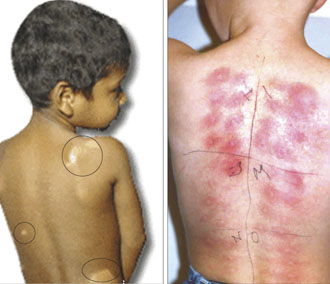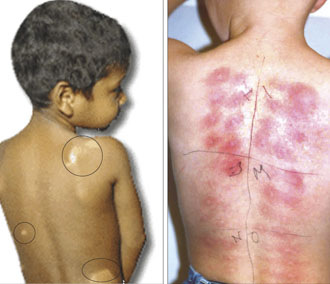
Dr. Yassin Al-Qubati:Modern medicine isn’t regulated, let alone alternative medicine [Archives:2006/1002/Health]
November 27 2006
 |
He's a doctor different from all others. He's a warrior, but on the medical front rather than the battlefield, having fought and defeated leprosy through his personal efforts.
He has represented Yemen at numerous international medical conferences and received both national and international honors and awards in return for his efforts and distinction.
He's Dr. Yassin Abdulaleem Al-Qubati, one of Yemen's most famous dermatologists. Our dialogue at his clinic yielded good news for dermatology patients, as can be seen in the following:
How did it happen that Yemen, specifically Taiz, was selected from among many famous Arab towns to host the Arab dermatologists conference?
Yemen has been an active member in the Arab Dermatologists Association since it was formed in 1983. The association is for all Arab doctorate and master's degree holders in dermatology and skin-related diseases. It launched its activities in Damascus in 1982 and held its second meeting in Amman in 1986. I've been a member of its administrative board up until now.
So far, the association has held nine conferences, the last of which was in Morocco. At that time, I took brochures of Taiz. Many Arab towns applied to host the conference; nonetheless, Taiz won the competition.
What's new in dermatology is hair transplants, liposuction, fat injections, facelifts and other cosmetic surgeries employing modern techniques. The aim is to help Arab dermatologists cope with new techniques in the field worldwide. For the first time in Yemen, there have been leprosy surgeries involving transferring cells from black spots to white ones.
What are Yemen's most common skin diseases and have some diseases started fading away?
The most common skin diseases involve allergies, which are the body's reaction to anything entering it. The immune system reacts violently to this foreign thing, thereby leading to psychological and physical damage inflicted upon the body via extracting substances that cause itching. Scratching causes more histamine to excrete and increases the itchiness. Further, there are diseases like leprosy, scabies and psoriasis in Yemen; however, diseases like leprosy and scabies have begun waning.
Do you think psychological and genetic factors play a role in the spread of skin diseases?
Genetic factors undoubtedly play an important role because skin diseases transfer from parents to their children. Continuous sun exposure is another factor.
Are there statistics about the number of skin disease patients in Yemen?
Unfortunately, we've been asking the Ministry of Health for a long time to establish a database for all skin-afflicted patients, as is the case throughout the world, but it's been in vain because they only excel at speaking.
What role does the environment play in increasing or decreasing skin diseases?
As for the natural environment, we have a very beautiful environment, but the problem exists within the society itself. Backwardness is still dominating and it seems we are content with it and we need not to look for the better. The citizen is the cause of environmental problems he lacks in environmental awareness.
Do certain foodstuffs cause skin diseases and if so, what are they?
Not all foodstuffs cause skin diseases. For example, certain foods like bananas, mangos, carrots, eggs or milk may aggravate an allergic person; however, we shouldn't randomly prevent people from eating certain foods because a patient may avoid all of them and still suffer allergies. Everyone should observe his or her eating habits carefully in order to know what items cause allergies and then avoid them.
You've been running the National Program to Fight Leprosy in Al-Noor city (for lepers) for more than 20 years and at a time when lepers were outcasts. How do you see public awareness and views about this disease today?
Mother Teresa initiated this program in Yemen in 1974, but it was so limited then. Citizens' view of leprosy was distorted, so patients were isolated in special locations. The same view was dominant worldwide as lepers were isolated on islands or in churches because there was no medicine for them at that time.
The program's organized work began in 1989, as prior to this date, it was only by personal efforts. Between 1982 and 1988, I sought support from international charitable organizations because governments didn't provide any support for lepers. Leprosy wasn't so common and further, it wasn't considered a fatal disease.
I found a German charitable society specialized in combating leprosy, which has been providing support until now. Moreover, we've received support from the World Health Organization and the Yemeni Society to Eliminate Tuberculosis and Leprosy.
What causes leprosy and what are its symptoms?
Leprosy is caused by a special type of bacteria and its symptoms include loss of sensitivity in a small area of skin, but without itchiness. Unless otherwise listed, any spot colored differently than skin color is leprosy.
Some skin diseases like psoriasis aren't infectious; however, they require lengthy treatment. What's new in this regard?
Leprosy involving loss of the skin's black color isn't infectious and there are many medicines for it. Treating it is a bit difficult; however, there are special operations for leprosy, some of which were performed during the Taiz conference, involving transferring chromosomal cells from the body to the affected areas.
Do you think herbal or alternative medicine has pulled the rug out from under modern medicine because patients no longer trust the latter?
In principle, there's no rug to be removed. Modern medicine itself isn't governed by medical laws. Further, there are no Ministry of Health regulations to determine who's a specialist and who isn't. Some may put up a sign to be an abdominal, surgical or heart specialist and no one prevents them from doing so. There's no control over laboratories, pharmacies or X-ray departments, nor any quality control.
Moreover, a license issued in Taiz in different than a license issued in Sana'a or Aden. What can we say about alternative medicine when there are no regulations for modern medicine? Now anyone can practice sorcery in the name of herbal medicine, but there should be regulations and laws to prevent exploiting citizens.
How do you assess the volume of cooperation and aid foreign governments and international organizations provide?
The volume of aid granted by international organizations is too low. Some organizations provide more aid to developed countries other than Yemen because we're unable to specify our demands in order to express them to such organizations.
What's your evaluation of the Ministry of Health's role, as the party responsible for public health?
All hope is pinned on the present Minister of Health, Dr. Abdulkarim Rasa'. Yemeni health care witnessed no improvement at the hands of former ministers of health, except under Dr. Mohammed Ahmed Al-Kabab and Dr. Abdullah Nasher.
You've received many appreciation and honorary awards and prizes from national, Arab and international parties in recognition of your efforts. What do these mean to you?
What do they mean to me?! They mean many efforts, sleeplessness and exhaustion, as well as more hard work until life comes to an end.
What's your advice for dermatology patients?
I'd like to tell patients not to worry about skin diseases because they're visible, as opposed to internal diseases, which can't be seen. Dermatological diseases can be treated and some may disappear without medication.
Any final comments?
My final words are directed at my colleagues. I exhort them to exert further efforts to acquire more knowledge and catch up with new discoveries in the medical field. Further, I ask them to deal honestly with people, particularly their patients, because with honesty, they can profit more, whether materially or spiritually, by acting within the public's love and respect.
——
[archive-e:1002-v:14-y:2006-d:2006-11-27-p:health]


